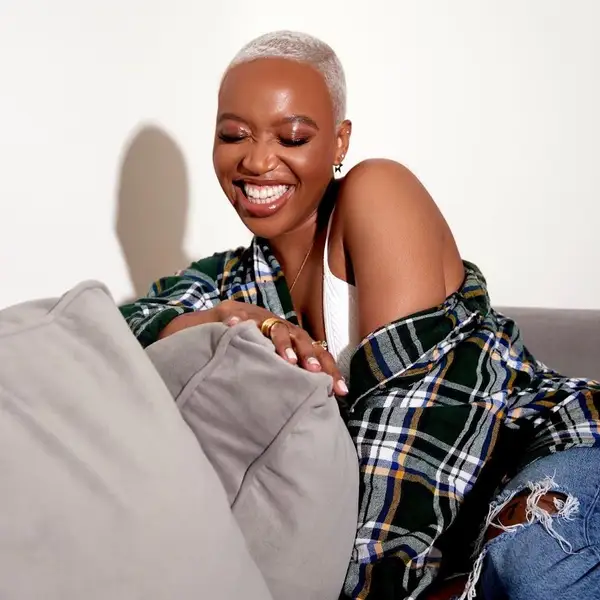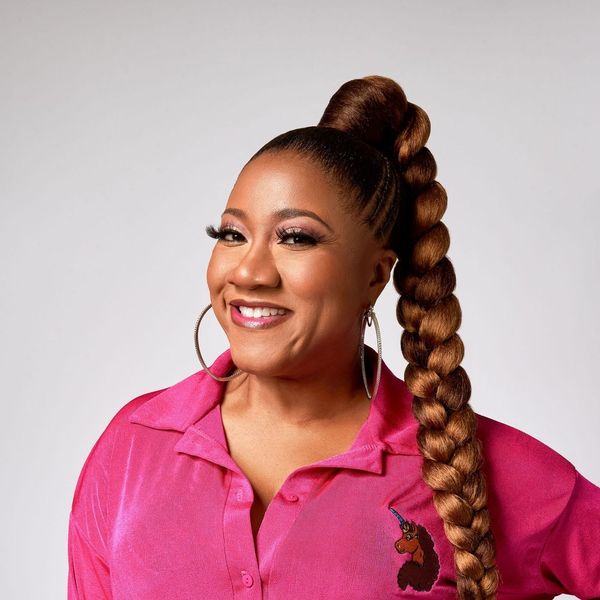Former Beyoncé Dancer Deja Riley On Changing Her Career For Her Mental Health

Born into the world of entertainment, Deja Riley is a star in her own right. And if her last name sounds familiar, it is because she is the daughter of legendary producer and King of New Jack Swing, Teddy Riley. But rather than rely on her father's connections and last name, Deja chose to forge her own path into the entertainment industry. Going from dancing professionally with the likes of Lady Gaga, Katy Perry, and the queen herself, Beyoncé, to now becoming one of the most sought-after MIRROR home fitness trainers, a lululemon global ambassador, and the creator of her own fitness brand, the Sweaty Smiles Squad.
In an exclusive with xoNecole, Deja opens up about her professional dance background, transitioning into a career in fitness, being an advocate for Black people in the fitness industry, and the importance of 'Deja Dailies' to her self-care routine.
xoNecole: Let's first get into your dance background. How long have you been a dancer and how did you begin dancing for some of our faves?
Deja Riley: Dancing is actually something that I've always done. My parents put me in dance at the age of three so it's always been a huge part of my life. Once I started competitively dancing at 12, I started taking it more seriously. When I moved to LA at the age of 19, my first dance job was working for Laurieann Gibson as her assistant. She was a huge mentor who gave me my first celebrity gig which was on Dancing with the Stars with Lady Gaga.
Since then, I have danced for Britney Spears, J.Lo, Nicki Minaj, Katy Perry, and the list goes on and on and on. So it's something that will always be a passion of mine. And I think that that is why I love dance fitness so much. It's because I get to incorporate both my passion for wellness and then my passion for dance as well.
xoN: What made you decide to transition into the health and fitness space?
DR: I've just always had this inclination to move my body. I love movement of all kinds. It varies from yoga to HIIT workouts. I love kickboxing. I love boxing. So at the age of 27 or 28, I was transitioning out of the dance industry. I remember being on the football field at Super Bowl 50, dancing behind Beyoncé with all of the glitz and glamour and lights. And I still felt small. I felt like I was not enough. And my mental health is important. So when I started feeling that way, I knew that it was time to shift. It was time to switch gears into something a lot more fulfilling for not just my body, but also my spirit and my mind.
It took six months to a year for me to fully make the transition. But I had already been working out a lot so I decided that I wanted to lean into fitness even more. At first, I was like, maybe I'll do some fitness modeling. Then I was like, maybe I'll go into personal training. And I landed in group fitness where I started my fitness journey as a leader.
"I remember being on the football field at Super Bowl 50, dancing behind Beyoncé with all of the glitz and glamour and lights. And I still felt small. I felt like I was not enough. And my mental health is important. So when I started feeling that way, I knew that it was time to shift."

lululemon
xoN: As a Black woman in the fitness industry, what hurdles have you had to overcome?
DR: That's a great question. Representation is so important. Especially because when I was a little girl, I didn't have very many examples of that. But we have more today. And it is up to trainers like me and other, Black and brown women to continue to pave the way and show our young Black women that you can lead a healthy and happy life. I think that is part of my mission, as a trainer, as an advocate, as an activist. I take that responsibility very, very seriously. In terms of obstacles that I've had to conquer, it goes back to the very beginning of my journey as a dancer.
I was oftentimes faced with this idea of tokenism. Like there can only be one of us in the group, or there can only be one of us on the platform. And that's not true. Combating that narrative is so important. It's not competing, it's about sisterhood. When negotiating my contract for Lululemon and MIRROR, I had to seek advice from other mentors in other industries because I didn't know anyone within our industry to help me navigate that. So now mentoring people that come after me is very important. I currently work with an organization called Fit For Us which advocates, supports, and continues to push the agenda forward for Black wellness and fitness professionals. That is near and dear to my heart.
I've done things like fireside chats, one-on-ones, and being transparent about fair wages and what other Black fitness professionals should look out for in their contracts. I think it is important that we continue to band together and teach those that come after us on progressing and pushing forward. And that's what I'm on a mission to continue to do.
"In terms of obstacles that I've had to conquer, it goes back to the very beginning of my journey as a dancer. I was oftentimes faced with this idea of tokenism. Like there can only be one of us in the group, or there can only be one of us on the platform. And that's not true. Combating that narrative is so important. It's not competing, it's about sisterhood."

lululemon
xoN: As the daughter of super-producer Teddy Riley, what was that journey like making a name for yourself and not relying on your father?
DR: I think what is often perceived by the public is that I got to where I am, because of my dad, and it's quite the opposite. We can never escape the name. My siblings and I work very hard. We all have different careers in different industries. And we all do our best to let our work and our character speak for themselves. My dad instilled in each one of us a very strong work ethic. So it was never an option to only lean on my last name. I always had to work for everything that I had.
When I was in the dance industry, I had to audition just like all of these other dancers and work for the job. My dad wasn't making phone calls to choreographers or artists for me to get the job. But I think that I do have the privilege and the honor of being able to get industry and career advice from somebody like him. He has paved the way for so many in the music industry, and I'm hoping to do the same in the fitness industry.
xoN: How do you prioritize yourself and approach self-care in your busy life and the different titles you juggle day-to-day?
DR: I make self-care a priority every day. I couldn't put out radiant, joyful energy in the world if I didn't start with me first. I use my 'Deja Dailies' -- my own internal assessment I roll through -- to set the tone for my day. I meditate first thing in the morning and take time to read and journal. I usually get into my favorite book of the month, read articles that challenge my brain or inspire me, and then take time to journal and take into account feelings that I need to get out on paper and release.
I make it a priority to get nourishment into my body, which could be through food, music, or movement, so I find space to dance or run, or whatever I need that day to feed my soul. I make sure to intentionally set the pace of my days; even if that means going to bed early or waking up earlier, ultimately I do what's necessary to be my best self each day.
"I make self-care a priority every day. I couldn't put out radiant, joyful energy in the world if I didn't start with me first... I make it a priority to get nourishment into my body, which could be through food, music, or movement, so I find space to dance or run, or whatever I need that day to feed my soul."

lululemon
xoN: What are some sustainable lifestyle changes that people can incorporate into their lives?
DR: So I'm going to give a little bit of motivational advice, and that is you have to do something that you love. If you don't find what resonates with your heart, you're eventually going to quit doing it. There are so many ways to move [your body]. Also, "Start where you are, use what you have, and do what you can."
That's actually a quote from Arthur Ashe. I think we oftentimes forget that he, like many others, had to start somewhere too. So I go back to that phrase often. And if you get overwhelmed, from looking at the entire staircase, just focus on one step, focus on being present.
For more of Deja Riley, follow her on Instagram @dejariley.
Featured image courtesy of Deja Riley
Sergio Hudson On Designing With Intention And Who Gets Left Out Of The Industry
Sergio Hudson dreamt big as a young South Carolina boy staring out of the window of his mom’s Volvo driving down the Ridgeway, South Carolina streets. Those dreams led him to design opulent tailoring that’s been worn by Beyoncé, Queen Latifah, former Vice President Kamala Harris and Forever First Lady Michelle Obama, just to name a few.
Those dreams have come full circle in a new way as he recently collaborated with Volvo for a mini capsule collection suitable for chic and stylish moments this fall. The 40-year-old designer follows a long legacy of fashion aficionados who’ve used their innovation to push the automotive industry forward, including Virgil Abloh, Eddie Bauer, Paul Smith and Jeremy Scott.
Using the same material from the interior of the Volvo EX90, Hudson crafted a wool-blend car coat and waistbelt that combine the vehicle’s Scandinavian design with his signature tailoring and intention. The exclusive collection launched on October 20, and each piece is made-to-order by Sergio Hudson Collections.

Courtesy
In October, I traveled to Charleston with a group of journalists to get a firsthand look at Hudson and Volvo’s location. During a fitting, Hudson said his goal is to make “great work that can stand the test of time.”
“People can look back on and say, ‘I remember when Sergio did that collaboration with Volvo,’” he continued. “Thinking about aligning yourself with classic brands that speak to where you want to go. And I think that's what this collaboration kind of means to me and my business.”
Hudson pinpoints his mom as the biggest influence for his designs. This collaboration was no different.
“This particular coat reminded me of the swing coats that my mom used to wear in the early 90s. You know, diva girls in the early 90s had Sandra suits,” he said, referring to Jackée Harry’s character in 227. “My mom wore those and she would have these matching swing coats to go over them. And that's where the initial idea came. This would be around the same time that we had our Volvo. So she would put on her suit, her swing coat, get in that red Volvo, and go to church.”

Courtesy
With this capsule and beyond, Hudson wants to see more staples rotating in and out of closets this fall. He advises fashionistas to build her closet out with essentials to mix and match that aren’t just stylish but also sustainable.
“It's just those special pieces,” he said. “You can wear the same shirt and pants every day and nobody will notice. But if you have a special boot, a special coat, a special bill, a special bag, that kind of speaks to everything that your style stands about, that is something you should focus on.”
These are the same kind of staple pieces that return to our Pinterest boards and TikTok feeds season after season. Fast fashion has never been Hudson’s aim. “I'm trying to create a special pieces that can stand the test of time,” he said in his warm, Southern accent. “I'm only creating those kind of pieces from here on out.”

Courtesy
For Hudson, this collaboration is revolutionary. It’s his first time working with a car company and experimenting outside of his wheelhouse in this way.
“This is a Scandinavian brand, and, you know, it's 70 years old. I'm an African-American boy from South Carolina that has had a brand for 10 years. So I think bridging those two worlds and seeing the similarities was the beauty of this project,” he explained.
Though Hudson and his partner and CEO of Sergio Hudson Collections Inga Beckham have made massive strides in just 10 years, Hudson said the industry is far from where he wants to see it when it comes to Black representation. He pointed to how few Black designers were at this year’s Met Gala despite the theme being Black dandyism.
“The fact that I dressed 18 people speaks to how many of us weren't there,” he said. He implored more of industries, fashion and beyond, to collaborate with Black designers often.
“Allow mentorship. Allow funding. Allow great design to shine through,” he implored. “When it comes to being a designer of African descent, when you can't get the funding that your counterparts have, you can't compete. When you get opportunities like doing a collaboration with Volvo, or you get opportunities to be at the Met Gala, that's putting us on the equal playing field, but really the funding behind it is what we need to take it to that desk level.”
Featured image courtesy
Y’all know what folks tend to do in the hours leading up to a new year — they make New Year’s Resolutions. And while I’m personally not the biggest fan of those (check out “Forget New Year's Resolutions, Try This Instead.”), what I do like to recommend is taking personal inventory to see what you need to hold on to and what you can stand to actually…let go of.
So, let’s get right into it.
As you’re thinking about all of what transpired over the past 12 months, here are some signs that certain things (or people) who are currently in your sphere may need to be significantly realigned or even, shoot…let go of. Ultimately, for your greater good.
1. Your Mind, Body and Spirit Aren’t in Agreement (About It)
 Giphy
GiphyI believe I’ve shared before that, back when I was writing my first book, although I adored my editing team overall, it was still a Christian-based one, and so there were a few things that we would clash on. Take the term “human trinity,” for example. They kept wanting me to say something else for fear that it would appear “blasphemous” to certain readers.
Meanwhile, I kept giving pushback because "trinity" is not an actual biblical word. It literally means a group of three or a triad and while that can apply to the Godhead (I John 5:8), nothing is wrong with applying it to other situations and dynamics too...and, to me, the mind, body and spirit of a person equates to what I call their “human trinity” — and something that I oftentimes tell my clients is, “If your mind, body and spirit” are not all in agreement about something (or someone), take heed to that; at the very least, it’s an orange flag, if not a flat-out red one.
So with that said, think about what you have going on in your life right now — if you’re not in a state of complete and total peace concerning everything, is it your mind that feels that way? Is it your body that seems a bit stressed? Is it your spirit that has you unsettled?
Always remember that your being — your mind, body, as well as your spirit — was created to work in harmony, and so, if that isn’t happening about a particular person, place, thing, or idea…you really should pause, ponder, and reflect before making any major moves. Oh, and if two parts of your trinity are struggling, 8/10, that is a sign that you definitely pump the brakes. At least until you figure out why.
2. It’s Spiritually Compromising You
 Giphy
GiphyI’m pretty sure that a lot of you have heard the quote, “You don't have a soul, you are a soul; you have a body,” before. If you thought that the writer C.S. Lewis authored it, many people do. Actually, it comes from a man whom he admired by the name of George MacDonald, and yes, it is quite profound when you stop to think about your spirit is the divine part of your being; yes, many consider it to also be your soul (check out “I’ve Got Some Ways For You To Start Pampering Your Soul”).
Since the essence of who you are pretty much comes from the spiritual side of you (check out “What's The Difference Between Being 'Religious' And Being 'Spiritual', Anyway?”), it’s important that you are super intentional about nurturing and nourishing it; this includes keeping safeguards up in order to prevent anyone or anything from compromising you from giving your spirit exactly what it needs to thrive and flourish.
For some of you, you know this means letting go of your partner. For some of you, a toxic friend. For others, it’s really time to find a new career path, shift churches (LISTEN), to move to another location (even if that’s another state or country) or to totally reroute your daily routine — and you know this to be true because your spirit is currently feeling drained and/or bitter and/or resentful and/or confused and/or like you are losing a part of who you are just to keep “it” around.
Sis, it’s not worth it. Compromising yourself at the expense of it costing yourself never EVER is. If what I just said hit really close to home, you’ve still got a few hours to leave it all behind in time for a brand and spanking new year. It might not be easy yet do it anyway. Your spirit deserves it.
3. You’ve “Hit a/the Ceiling”
 Giphy
GiphyI ain’t got no lies to tell you — between the orange one in the White House and his uber-maniac ways and AI sinking its teeth deeper and deeper into so many different industries, I definitely think that 2026 is going to be a roller coaster ride for many people as far as the job market is concerned. So, while I am ABSOLUTELY NOT recommending that you flippantly, emotionally, or impulsively quit your job any time soon, I do think that you should ask yourself if you’ve “hit the ceiling” where you are, so that you can possibly plan to look for employment elsewhere or even pivot into something else entirely.
And what are some signs that you have indeed knocked your head up against said ceiling?
- You are bored as hell (or worse, miserable AF) at work
- There is no room for promotion
- Your boss couldn’t care less about your goals or ambitions
- You feel undervalued
- Your skills are underutilized
- There seems to be little to no improvement or progress within the company
- You haven’t received a raise in years
- You procrastinate because you don’t feel motivated or inspired
The fact that most of us spend the majority of our waking hours working, it makes not one bit of sense to be collecting a check at a place that is stressing you out, messing with your psyche and/or is causing you to feel like there’s not much more that life has to offer than, as they say, “paying bills and dying.” If that is what life is like for you right now, although you might not be able to quit this month, it is definitely time to put an exit strategy into place. You know, some say that a whopping 85 percent of people hate their job.
If you are one of them, let’s strive to have that no longer be the case in 2026.
4. There Is Little-to-No Reciprocity
 Giphy
GiphyI’m not a fan of transactional dating (check out “Guess What? Dating Was Never Supposed To Be Transactional.” and “Should You Start Off As Friends? Science Says Absolutely.”); anyone who knows me will tell you that. And when guys talk to me about how drained they feel by a woman who seems to only take and not give (for instance, someone just talked to me about how his girlfriend of three years gave him a $20 gift card; meanwhile, he purchased her seven different presents…and she actually makes more money than he does — SMDH), I will oftentimes say, “If there’s no reciprocity, she is a liability.” And I mean it with everything in me.
This goes beyond romantic situations too. Take a friend of mine who, when I tell you that, when it comes to painful situations, she absolutely sucks at being a good support system. I know this because, for the past few weeks, I’ve been telling her that she has a pattern of not showing up in hurtful times and that my patience is wearing thin because I am just the opposite.
She shared with me that she realizes that she doesn’t show up for herself in her own painful moments, and so when something really uncomfortable, trying, or taxing happens to someone else, she tends to retreat instead of reaching out.
In other ways, she’s solid, and so we are working through the matter — but I’ll tell you this: At this point in my life, when I share where I need reciprocit,y and folks don’t want to give it, I have no problem shifting how I prioritize them in my world. Because it makes no sense to call someone “friend” (or partner) and you’re doing most of the work to make that word…relevant.
Bottom line with this one is, if you’re not getting what you need from your relationships — ANY KIND OF RELATIONSHIP — it just might be time to leave certain people behind…now (check out “Why I Don't 'Cut People Off' Anymore, I Release Them Instead”)…so that you have room for who will be willing to show you what reciprocity in relationships looks and feels like.
5. You Feel “Stuck” in “It”
 Giphy
GiphyWhen it comes to the word “stuck,” the definition that I’m coming from here is “to become fastened, hindered, checked, or stationary by some obstruction” — and for the sake of time and space, what I want to amplify is the word “hinder.” One definition of hinder is “to cause delay, interruption, or difficulty in; hamper; impede,” while another is “to prevent from doing, acting, or happening; stop.”
Believe it or not, as a marriage life coach, there are actually clients who I have fired — and the reason was that they were wasting my time. Listen, when you get to the point in your life where you get that there is less time in front of you than behind you, you can’t really put a price tag on your precious moments, so when clients don’t do their homework and/or choose to remain in ridiculous situations (for years at a time) and/or really just want to be coddled instead of getting the tips and tools that they need to make wise decisions on their own — they cause me to feel “stuck” because they aren’t challenging me to be a better coach.
Progress in a client is what makes me better…and so, what I will typically do is put these types of people on probation for about 4-6 months and then release them if they remain in their hamster wheel of cyclic activity (after over a year of working with them).
This is an example of what “stuck” looks and feels like in my life; however, you need to figure out if and how that word may apply to your own. What I can tell you is anything that you know is interrupting or preventing you from doing what you know needs to happen in your world, whether it’s a person, place, thing or idea, you really need to ask yourself if it’s worth holding on to — and if you believe that it is, you definitely should realign your boundaries concerning it or then. Because again, life is too short (and precious) to be “stuck” in something that really isn’t serving you (or serving you any longer).
6. Your Present and Future Seem Super Foggy with It Around
 Giphy
GiphyWhat does this mean? Well, fogginess speaks to things being unclear, right? When it comes to your present, a lack of clarity can speak to feeling/being confused and confusion means that something is going on that either doesn’t make sense to us or is sending us all kinds of mixed messages and signals — and when you continue to dwell in that kind of space, there’s a pretty good chance that your future will be just as…foggy. Just as unclear. Just as confusing.
I’ll explain. Have you ever tried to drive in the fog? You typically can’t see very far ahead, which means that you kind of have to drag along in your car and, even with headlights, sometimes something can run out in front of you, catch you off guard and that can either make your nerves bad or cause you to wreck. Along these same lines, a “foggy situation” can do the same thing — you’ll be out here barely getting anything done because you’re so busy trying to figure out what the hell is going on with it or them…and that usually will cause a domino effect in other areas of your life too.
Sis, it’s not worth it. If you don’t get what’s going on in some area of your world, you’re missing information, you are being gaslit, and/or you are in denial about what is transpiring right before your very eyes. For all of this, purpose to get the answers (clarity) that you seek or leave it behind you.
As an author by the name of Shannon L. Alder once said, “The most confused you will ever get is when you try to convince your heart and spirit of something your mind knows is a lie.” Somebody REALLY needed to hear that today. I hope that you did.
Just in time for another year, and the things that you can feel really good and CRYSTAL CLEAR about.
Welcome to 2026, my dear.
Featured image by Shutterstock
Here's What 2026 Has In Store For You, Based On Your Zodiac Sign
2026 is a year of love, growth, and reflection. As a universal 1-year, 2026 is signifying a time of new beginnings. New doors open, and this is the perfect space to build new foundations, relationships, and successes in your world. This year is about what you do with what you are receiving and understanding the power of intention and innovation.
It’s about having balance between your individual needs and the needs of your relationships, and knowing that you can have it all. 2026 reminds us of the importance of community, and new bridges will be built.
Overall, this year has some pleasant and unexpected surprises in store, and this is the year to follow your heart.
Key Astrological Transits of 2026
June 30: Jupiter Enters Leo
Jupiter enters Leo this year until 2027, and this is especially good news for fire signs: Leo, Aries, and Sagittarius, and for fixed signs: Aquarius and Scorpio. Jupiter in Leo is grand, regal, and over-the-top, and you can expect a lot of this energy in 2026. This is the time to own your creativity, your self-empowerment, and what makes you shine in life. You can align with the blessings of Jupiter by aligning with your heart and what makes you truly happy in life. This year is about being confident in your inner knowing and showing up.
July 27: North Node in Aquarius/South Node in Leo
The North Node moves into Aquarius, and the South Node enters Leo mid-year until 2028, and this is instrumental for the collective. With the North Node in Aquarius, authenticity is the direction to be heading. More people will be showing up exactly as they are, and feeling confident in their unique signature in life. We are letting go of the need to always be put together or be seen as “perfect” and embracing more community, genuineness, and eccentricity. New technological advances that shift the world are also more likely with the North Node in Aquarius.
October 3: Venus Retrograde in Scorpio/Libra
Venus goes retrograde every other year, and 2026 is a Venus Retrograde year. Venus will be retrograde in Scorpio from October 3 until October 25, and it’s important to be patient in matters of love and not to rush into things here. Take the time to get to know your past, present, and future in love better at this time, and don’t overcommit to things you don’t have the energy to see through. Venus will then be retrograde in Libra from October 25 until November 13, and this retrograde period brings you closer to the partnerships that serve you in life and helps you reflect on what these relationships may need to feel more stable and secure.
Overall, we are gaining clarity in love this year.
Read for your sun and rising sign below to see what 2026 has in store for you.
ARIES
This year is about putting yourself and your dreams first, Aries. You are on the path towards abundance, and your to-do list is piling up. This is the year to be confident in the things you are developing, consider all perspectives, and open up to new opportunities. Saturn, the planet of strength, hard work, and dedication, is in your sign for the entire year, and you are overcoming. Saturn tends to challenge you more than anything, and this year, it's challenging you to evolve.
This is the year to create a new plan and take the steps needed to fulfill it.
With Neptune also in Aries for the entire year, you have wisdom, creativity, and imagination on your side, and 2026 overall is the year to believe in the impossible. Connecting more deeply with your spirituality is also serving you this year, as you define your belief systems, interests, and inspiration, and let life guide you. It’s all about having balance this year, Aries. Move when you feel inspired to move, and allow when you feel ready to let go and receive.
TAURUS
2026 is your year of connection, collaboration, and increasing your earnings, Taurus. You are walking into the year full of empowerment and vision, and you know what you want to accomplish and who you want to accomplish it with. Opportunities to work with others and create something beautiful in your world are more prevalent this year, and you have the Midas Touch in 2026. This year is all about dedicating yourself to your dreams and being proud of yourself and your efforts.
The New Moon in Taurus on May 16 is a groundbreaking moment for you in 2026, and a time when you feel like you are embarking on a new chapter in your life. Embrace the opportunities that come your way mid-year, and know that you have what it takes to succeed. On June 19, Chiron, the wounded healer, enters your sign, and you enter a new journey of getting to know yourself, your past, and your inner world better.
Chiron will be in Taurus until September 17, will briefly enter Aries until April 2027, and then will transit back into your sign until July 2033, so there is time, but overall, you are opening the door to healing this year.
GEMINI
2026 is a transformative year for you, Gemini. You are awakening to new ideas, insight, and experiences, and it can feel like there is a lot to take in right now. This is your year of embarking on a new journey and defining what you want for yourself. Things change, perspectives shift, and it’s about what you do with what you know now. Uranus, the planet of upheaval, change, and rebellion, is in your sign from April 25 until May 2033, and this year is about expecting the unexpected.
Know that everything happens for a reason, and what transforms for you now is creating the space for new life to grow.
Jupiter, the planet of blessings and expansion, also changes signs this year, and for you, this means a new outlook on life altogether. Jupiter will be in your 3rd house of communication from June 30 until July 26, 2027, and the vision is there for you. This is a great year for publication, writing, short travels, social media, and networking, and you are learning how to take up space right now. Overall, 2026 is about getting the answers you have been looking for, feeling empowered to express yourself, and allowing transformations to move you into a new beginning.
CANCER
This year is about knowing you are supported and finding your strength, Cancer. You have been working hard on building the things that matter to you and finding your stability in life, and this year is that last push towards your dreams. You have been protecting your energy and your peace; however, this year reminds you that remaining overly vigilant can hinder you from being open to new opportunities that can actually serve you in life.
Remember to listen to your intuition more than your fears this year, and trust that you are being guided in the right direction.
We begin the year with a Supermoon in Cancer on January 3, and end the year with a Supermoon in Cancer on December 23 as well. This is major news, and points to some life-changing closures, culminations, and inner awakenings happening for you in 2026. With Jupiter also in your sign until June 30, luck is still on your side right now. Your life is expanding, and it’s time to catch up to the new chapters that want to take place for you by letting go of what hasn’t been working.
This year isn’t about sticking to what is comfortable; it’s about opening your mind and your heart to new possibilities.
LEO
2026 is your year of freedom, success, and stability, Leo. You have a lot of things working out for you this year, and it’s because you have done the work and trusted yourself and your unique journey in the process. The mountains you have climbed are behind you now, and you are ready to experience the fruition of the intentions you have set for yourself. Jupiter, the planet of luck, moves into your sign this year from June 30 until July 26, 2027, and you enter a fortunate time in your life.
With Jupiter in Leo, all eyes are on you, new opportunities come into your life, and you are feeling sure of yourself.
This year not only empowers you, but it also helps you let go of what has been disrupting your healing journey. The South Node enters Leo from July 2026 until March 2028, and you are moving through the process of getting to know yourself and your past better. You are going over the things you have identified yourself with, the experiences that have shaped you into the person you are today, and what this all means for the way you experience life overall today. This year is about evolving, letting go, and claiming new blessings.
VIRGO
2026 gives you perspective, Virgo. This year is a new beginning for you altogether, and you are taking things one step at a time. The vision is clear, the intentions are set, and you know what needs to be done to live a life of fulfillment. With the South Node in Virgo until July 26, you are still in the process of healing from the past, discovering new truths about yourself, and rewriting your story. This is a defining year for you, and the confidence you have in your vision for the future is creating new success, connections, and opportunities for yourself.
This year is about speaking up, gaining clarity, and being the star of your world.
With a Lunar Eclipse in Virgo on March 3, you are moving into the year with the need for closure and redemption. You have been through the process of letting go and creating anew, and this back-and-forth energy finally comes to a close for you at this time. You have taken care of yourself and your dreams, and now it’s time to allow yourself to be taken care of more and to embrace the new success that wants to come into your life. Know that sometimes things just work out without reason, and that when little miracles happen for you this year, accept them.
LIBRA
2026 is all about having patience, setting new intentions, and sticking to the plan, Libra. You are walking into the year with a lot of responsibilities on your plate, but it’s nothing you can’t handle or delegate. Look for new resources and opportunities this year, and don’t allow yourself to get caught up in the timing of it all. Things happen when you least expect them to, and it’s about trusting that things are working out behind the scenes for you right now.
With Jupiter moving into your 11th house of friendships this year, your support systems are instrumental to your growth in 2026 and will be a guiding force of love and community for you.
As you walk into the year, write a list of the defining experiences you want to have this year. Don’t have any expectations on the timing of it all or how exactly things will play out for you; leave that up to the universe. However, create the plan and get the vision going. With Venus going retrograde in your sign at the end of the year, from October 25 through November 13, you will be leaving this year with more clarity of the heart.
Relationship dynamics shift, and you are recognizing more of what your heart needs in order to feel seen, supported, and abundant.
SCORPIO
This is a powerful year for you, Scorpio. 2026 is all about living out your dreams and experiencing the successes you have been working towards. You have set the intentions and done the work, and the manifestations you once dreamed of come into your reality. This year is about getting your ducks in a row, preparing yourself for the opportunities you have wanted, and knowing that you are exactly where you are meant to be.
You are entering a year of empowerment and abundance, and are owning your independence and positive energy in the process.
Jupiter, the planet of fortune and good luck, moves into your house of career and achievements mid-year, and you are accomplishing some major feats. Your career and professional life are taking off, and you are a hot commodity in 2026. This is your year of believing in yourself wholeheartedly, and not self-sabotaging the good that is in front of you. At the end of the year, Venus goes retrograde in your sign from October 3 until October 25, and your heart is doing some healing, reconnecting, and self-reflecting. Overall, this is a major year of growth for you, and you are moving through life head-on.
SAGITTARIUS
2026 moves quickly for you, Sagittarius. You are experiencing some renewed enlightenment, and this is an important year for communication matters. It’s about trusting your process, not rushing into anything, and allowing your mind to catch up to your body. Be careful with being too impulsive this year, but overall, trust that you will know what you need to know when you are ready to. Life is expanding for you overall in 2026, and your mind is expanding in the process. Pay attention to the conversations you are having this year, as this is when a lot of things are shifting for you.
With Saturn in your 5th house of romance for the entire year, you are on a journey of redefining what happiness means to you.
Have you been putting your positive experiences, happiness, and romantic life on the back burner too often? This is where massive changes are taking place for you this year, and when you get a better look at what you need to feel truly fulfilled and your heart a little lighter. On June 30, Jupiter, your ruling planet, moves into your 9th house of travel and adventure, and this is when things really start picking up for you this year. You are crossing off your bucket list as you move through 2026, and learning something new about yourself and the world around you in the process.
CAPRICORN
2026 is all about taking on new opportunities and owning the momentum you feel in your life right now, Capricorn. This is a fast-moving year for you, and things happen in the blink of an eye. You are feeling motivated towards your new beginnings and are experiencing a lot of support and fortunate opportunities that you have been looking forward to in the process. It’s about taking more time to listen to your intuition and instincts and trusting that you are making the best decisions for yourself.
With Saturn, your ruling planet, in your 4th house of home this year, you are rebuilding your safe spaces right now.
Dynamics shift, and this is helping you get a clearer view of what is working and what isn’t working for you regarding family life, home, financial security, your inner world, and how you process things here. With the North Node also moving into your house of communication mid-year, you are learning more about the power of your thoughts and the words you put out there. This year is about speaking into existence what you want to happen and understanding the power you hold as the creator of your life.
AQUARIUS
2026 is the year of owning the balance you have found in your life, Aquarius. You are giving and receiving freely, and feeling more abundant than you have in a while. Things just flow and work out for you in 2026, and it’s time to own that you deserve this energy. You have been putting into place and preparing for the things that are finally happening for you this year, and it’s time to feel good about it all. This year reminds you that you are worthy of freedom, abundance, and success, and that the more you embrace this knowing, the more it becomes your reality.
We enter the year with a Solar Eclipse in Aquarius on February 17, signifying a year of new beginnings, change, and personal growth for you.
Who you are when you enter the year is a different person from who you are when you leave it, and you are feeling more like yourself overall. The North Node of Destiny also enters your sign this year on July 26 until March 2028, and you embark on a journey of blessings. Life changes dramatically for you over the next few years, and this year is that first step towards change. You are owning your independence while also understanding the importance of the relationships that are growing for you this year.
PISCES
This year is about allowing life to come full circle and trusting that you are supported along the way, Pisces. There is a lot to think about and process this year, and it’s important to be a little kinder to yourself. Give yourself grace and know that you will move through this time and overcome what is needed. With the North Node in your sign until July 26, rewriting your destiny, you have the power to make some massive shifts in your life this year and to truly align yourself with the vision you have for your future that supports your abundance, power, and intentions.
It can feel like a lot is happening at once this year, and it’s important to focus more on your perspective of it all.
If you are focusing more on the things that aren’t working out for you or comparing your journey to others, you might feel disheartened and stagnant. The Lunar Eclipse in Pisces on August 28 is the perfect opportunity for growth for you, and when you can really let go of the self-sabotage or fears that have made you overthink your blessings. Overall, this year is a reminder that you are worthy, loved, and intelligent, and you can make the best decisions for yourself.
Featured image by Shutterstock










